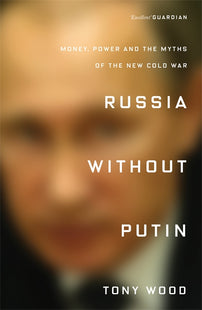Five book plan: The making of Putin’s Russia
As Vladimir Putin attempts to extend his grip on power into the future, Tony Wood, author of new-in-paperback Russia Without Putin, picks out five books that will help us think about how Russia works, and where Putin's power came from in the first place.

With the rise in tensions between Russia and the West in recent years, and in particular since the 2016 US elections, the catalogue of Putin books and Putin commentary has grown exponentially. But rather than sifting through all of those, I’ve selected a handful of the books that helped shape my thinking about the tumultuous political, social, economic, and cultural changes Russia has undergone since the fall of Communism.
One of the arguments I make in Russia without Putin is that the wrenching transition to capitalism during the 1990s was what created the system Putin presides over now, and which he has refined and consolidated over the past two decades. Here, then, are a few books that provide different angles on that process—and by the same token, on Russia’s present.
Caroline Humphrey, The Unmaking of Soviet Life: Everyday Economies After Socialism: Cornell University Press, 2002
The end of state socialism in Russia was not an instantaneous drop of the curtain, but a prolonged and painful process of dismantling of the old, which continued even as the new capitalist order took root. Humphrey’s anthropological eye captures the lived realities of that process in 1990s Russia, giving us acute portraits of places and people often left out of standard accounts: market traders and mafiosi in the provinces, collective farmers in Buryatia, Siberian shamans. We get to see how the “unmaking” of her title affected ordinary (and extraordinary) Russians, and how they at the same time struggled to make sense of the new system taking shape around them.
Alena Ledeneva, How Russia Really Works: The Informal Practices That Shaped Post-Soviet Politics: Cornell University Press, 2006
Most people outside Russia only learned the word kompromat—compromising material, gathered for purposes of blackmail—from coverage of Russian meddling in the US elections (and in particular from allegations that the Kremlin’s intelligence services had some such dirt on Trump). But as sociologist Ledeneva shows, the use of kompromat was widespread in Russian business during the 1990s, just one of a range of informal practices that became integral to the cutthroat world of the new capitalism. If you want to understand the mindset of the contemporary Russian political and business elite, it’s not communism or the shadowy traditions of the KGB you need to look at, but the mechanisms through which capitalism was established in the 1990s.
Vladimir Sorokin, trans. Jamey Gambrell Day of the Oprichnik: Farrar, Straus and Giroux, 2011
It can often seem as if outlandish satire is the only kind of literature that is up to the task of depicting the headlong transformations and feverish excesses of contemporary Russia. Sorokin, who has the rare distinction of having been a literary enfant terrible both during Soviet and post-Soviet times, delivers a bleak vision of a near-future Russia in which the brutal governing methods of the tsars have been combined with the latest technology. A sinister force of oprichniki—the name is derived from that of Ivan the Terrible’s personal security force—roams the land in sleek “Mercedovs,” whipping the population into submission while checking share prices on their “news bubbles.” It’s a brilliant depiction of the current Russian elite’s predilections, all the more truthful for its exaggerated inventiveness.
Thane Gustafson, Wheel of Fortune: The Battle for Oil and Power in Russia: Harvard University Press, 2012
Oil has been central to Russia’s fate over the past three decades and more. Collapsing global prices in the 1980s helped send the Soviet economy into a death spiral, and a period of sustained cheap oil made the 1990s depression even worse than it already was. Putin’s arrival in power at the end of the century, on the other hand, coincided with a long upswing in commodity prices, and the ensuing petro-fuelled boom was a key source of Putin’s enduring popularity. Gustafson provides an informative, even-handed guide to the transformation of the Russian oil industry since the late Soviet era, chronicling not only the vicious struggles over ownership and control of this key resource, but also clashes between Soviet and American technological cultures, as foreign experts helped overhaul corporate structures and extraction methods in the empty expanses of Western Siberia.
Viktoria Lomasko Other Russias: n+1, 2017
Most reporting on Russia tends to be focused on the Kremlin, with newspapers and magazines occasionally sending a correspondent out to the provinces. As a result, whole swathes of Russian experience get left out of the picture, or else intrude only to supply “local colour”. As the title of her book suggests, Lomasko’s “graphic reportage” provides a window onto largely neglected areas of Russian society, ranging from juvenile prisons and rural schools to sex workers, pensioners, and Central Asian migrants. While her line drawings have some of the immediacy of photographs, the captions and accompanying texts are clearly the product of a more open-ended dialogue with her subjects. Thanks to Lomasko’s deft use of this hybrid genre, we can hear their voices—ironic, impatient, warm, despairing, angry, hopeful—and imagine more fully the world as they see it.
See other 5 Book Plans here.

